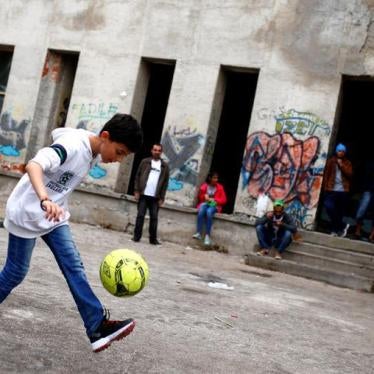Bosnia and Herzegovina’s blanket bans on certain age groups from going outdoors during the pandemic are not only harsh, arbitrary, and discriminatory – but also risk worsening public health outcomes.
In response to the spread of COVID-19, both entities in Bosnia and Herzegovina, the Federation of Bosnia and Herzegovina and Republika Srpska, have imposed strict bans on anyone over 65 from leaving their home for any reason, even for a short walk, to get groceries, or go to the pharmacy.
The Federation has also banned children from going outdoors. Anyone in either age group found violating the orders may be fined. This is not theoretical; 217 people over 65 have already been fined in Republika Srpska.
These orders remain in effect until further notice in the Federation and until April 13 in Republika Srpska. As of March 27, authorities in the Federation had amended the order to allow children with disabilities to go outdoors, within 100 meters of their home, and on March 30 Republika Srpska moved to allow people over 65 to go out on Tuesdays and Fridays between 7am and 10am.
The motive behind the bans is to protect people potentially at high risk if infected and reduce the spread of COVID-19. But the bans are ill suited to achieving those goals and impose overly harsh restrictions on both age groups in a way that is ultimately arbitrary and discriminatory. The authorities in both entities should roll them back, and stop imposing punitive fines on older people and children.
Bosnia and Herzegovina is not alone in using age as a determinant for developing guidance to particular populations, but has taken it to extremes by creating a punishable offence that only certain age groups can be charged with.
The rights group Human Rights Watch has received official data showing that between March 20 and 30, police in Republika Srpska issued 217 fines to older people, and that police in the Sarajevo Canton issued 20 such fines, some to children.
The spokesperson for the Interior Ministry in the Canton of Sarajevo said that older people who ask for permission to leave their homes in exceptional circumstances, for example, to visit a doctor, will not be fined. The spokesperson also clarified that the average fine was 500 Marks, or about 255 euros, which is higher than the average monthly pension in either the Federation [less than 420 Marks] or Republika Srpska [less than 380 Marks].
International law permits restrictions on certain rights, and at times, such as during the COVID-19 pandemic, more extensive restrictions may be justified. But they still have to be evidence-based and neither arbitrary nor discriminatory. And they also need to be limited in duration, subject to review, and necessary and proportionate to achieve the objective.
The orders in Bosnia and Herzegovina do not meet these criteria. First, singling out age as the sole determinant is problematic. While older people are among those at high risk of death from COVID-19, there are also increased risks for people of any age with certain underlying health conditions. These include heart and lung diseases, including asthma or chronic obstructive pulmonary disease, liver disease, diabetes, cancer and compromised immune systems, and likely current or recent pregnancy. Growing evidence globally shows that adults across all age groups may ultimately require hospitalization if they contract COVID-19.
If the objective of the order is to protect people at high risk, limiting it to people over 65 is arbitrary. There are effective ways to prevent exposure, such as social distancing and strict hygiene including hand washing and not touching your face. Banning people from going outside is not strictly necessary.
Research also suggests that children with COVID-19 have less severe symptoms and lower mortality rates than other age groups. There is little evidence that children play a significant role in asymptomatic transmission, and there is no need to restrict their right to go outdoors, if they adhere to the same social distancing restrictions as adults.
The order can also be a burden on parents and a challenge for children if they must stay confined for extended periods of time. One mother of two boys, aged three and 11, told us: “The kids have been confined to the house for 15 days now. The boys are restless and nervous. They are bored. They sleep less. The older one has tantrums and the younger one cries more often. …I’ve always been in favour of avoiding gatherings, playrooms and parks full of children during flu season, for example. But I don’t understand why now they cannot even go out a few meters from our apartment building or get in and out of [the] car.”
Older people subject to such extreme social isolation may struggle to get food, health services and medicine, and their health and mental well-being may be harmed as a result. The daughter of a 72-year-old woman who lives alone in Zenica told us: “Fortunately, neighbours help out and make sure she has food…. [It’s] more the psychological impact. It is not easy to handle this isolation, especially for people who live alone.
“What really made me sad the other day was when mom told me: ‘If I could just go out to throw away the trash’ …How terrifying it is that it would mean something to her to be able to walk for 20 or 30 meters to the trash container!”
Many governments in Europe and beyond are taking extraordinary measures to protect public health during the pandemic. In some cases, it will be difficult to determine whether responses are proportionate and comply with international norms. But blanket measures that impose an undue burden on certain age groups, and may in fact create other risks for them, are neither strictly necessary nor based on the best evidence.
Indeed, they can undermine public health, not least by leading other people to believe that they face minimal or no risk, or undermining the important message of other more effective preventive measures. The authorities in both entities should immediately end the system of fines and misdemeanours, revoke the current orders, and drop a criminal law approach.
Better to opt instead to require everyone to practice evidence-based measures, including social distancing, hand washing, and isolation of those who become sick or who have been exposed. Such measures, which can be monitored and reviewed as the pandemic runs its course, will help protect the right to health and prevent disease transmission without discrimination.










